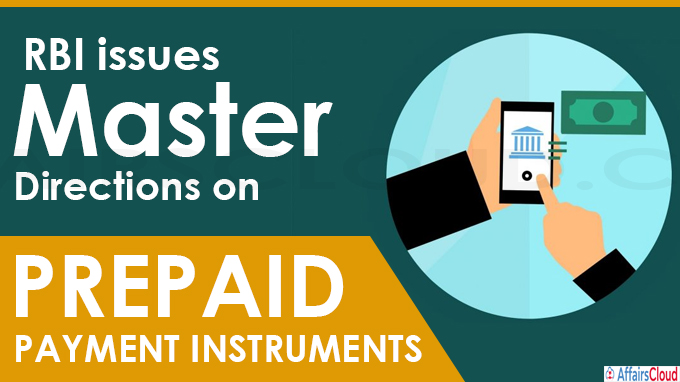 Reserve Bank of India (RBI) issued Master Directions on Prepaid Payment Instruments, 2021 (MD-PPIs, 2021), which are applicable to all Prepaid Payment Instrument (PPI) Issuers and System Participants.
Reserve Bank of India (RBI) issued Master Directions on Prepaid Payment Instruments, 2021 (MD-PPIs, 2021), which are applicable to all Prepaid Payment Instrument (PPI) Issuers and System Participants.
- Objective: To provide a framework for authorisation, regulation, and supervision of entities issuing and operating PPIs in India.
- The MD-PPIs, 2021 involves the eligibility criteria and the conditions of use for Payment System Operators (PSOs) involved in the issuance and operation of PPIs in India.
What is PPI?
It is an instrument that facilitates the purchase of goods and services, financial services, remittance facilities, etc., against the value stored on such instruments.
Note – Banks and non-bank entities will be allowed to issue PPIs in India after obtaining necessary approval from RBI under the Payment and Settlement Systems (PSS) Act, 2007.
PPIs Classification:
i.Earlier Classification: Earlier RBI has classified PPIs into 3 types as Closed System PPIs, Semi-closed System PPIs, and Open System PPIs.
ii.Current Classification: Presently, under the MD-PPI,2021, RBI has classified the PPIs into 2 types as Small PPIs and Full-KYC PPIs.
| Small PPIs | Full-KYC PPIs |
|---|---|
| These PPIs are issued by banks and non-banks after obtaining minimum details of the PPI holder | Issued by banks and non-banks after completing Know Your Customer (KYC) of the PPI holder |
| Could be used for the purchase of goods and services | Could be used for the purchase of goods and services |
| Funds transfer or cash withdrawal is not permitted | Funds transfer or cash withdrawal is permitted |
| Outstanding Amount – Upto Rs 10,000/ month, not exceeding Rs 1.2 lakh/year | Outstanding Amount – Not exceeding Rs 2 lakh (earlier it was Rs 1 lakh) |
iii.In the case of bank-issued Full-KYC PPIs, the cash withdrawal at PoS (Point of Sale) devices was subjected to a limit of Rs 2,000/ transaction with an overall monthly limit of Rs 10,000.
iv.Small PPIs should be converted into full-KYC PPIs within 24 months from the date of issue of the PPI.
v.Other Specific categories of PPIs include PPIs for Mass Transit Systems (PPI-MTS) and Gift PPIs.
Highlights of MD-PPIs, 2021:
a.Interoperability:
i.Interoperability is the technical compatibility that enables a payment system to be used in conjunction with other payment systems.
ii.The PPI issuers were directed to achieve interoperability through Unified Payment Interface (UPI) (for PPIs in the form of wallets) and National Payments Corporation of India (NPCI) and the card networks (for PPIs in the form of cards (physical or virtual)).
iii.PPI-MTS was exempted from interoperability, whereas the Gift PPIs were provided with the option to offer interoperability.
iv.On the acceptance side, the QR codes in all modes should be interoperable by March 31, 2022.
b.Validity and Redemption:
i.All PPIs issued in India should have a minimum validity period of 1 year from the date of last loading/reloading in the PPI. The PPIs could also be issued with longer validity.
ii.For PPIs in the form of a card, the customer should have the option to replace the card.
c.Redressal Mechanism: PPI issuers were directed to form a formal, publicly disclosed customer grievance redressal framework, with designating a nodal officer to handle the customer complaints/grievances.
d.Security: All cash withdrawal transactions performed using a card/wallet, should be authenticated by an Additional Factor of Authentication (AFA)/ Two Factor Authentication (2FA).
- 2FA / AFA is not a mandatory one for PPIs issued under PPI-MTS and Gift PPIs.
RBI has issued the above directions in the exercise of the powers conferred under Section 18 read with Section 10(2) of the PSS Act, 2007 (Act 51 of 2007).
Recent Related News:
On May 19, 2021, the RBI mandated that all prepaid payment instruments (PPIs) or mobile wallets such as Paytm, PhonePe and Mobikwik that are fully KYC-compliant to be made interoperable by March 31, 2022.
About Reserve Bank of India (RBI):
i.It was established on the recommendation of the Hilton Young Commission.
ii.The First Governor of RBI was Sir Osborne Smith (1935 – 1937).
iii.The First Indian Governor of RBI was CD Deshmukh (1943 – 1949).
iv.Manmohan Singh was the only Prime Minister to have also served as the Governor of RBI ((1982 – 1985).




